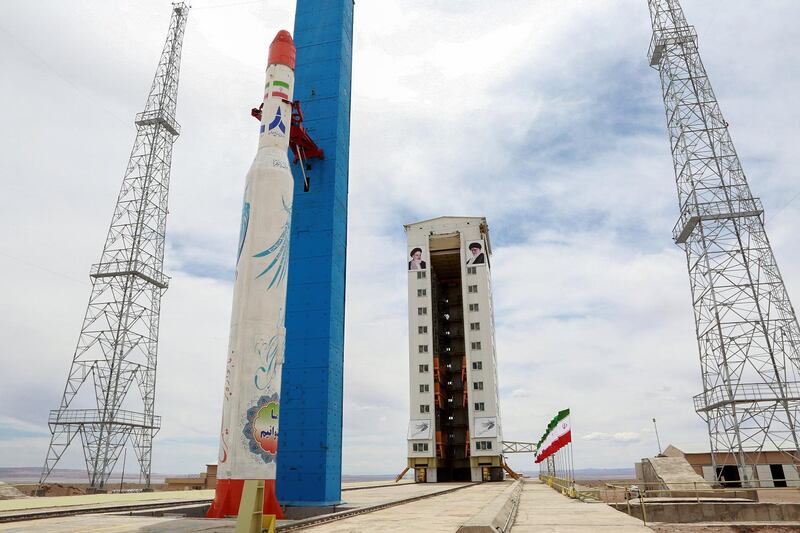When China landed an explorer robot on the far side of the Moon last week, it underlined the ability of space to inspire and grip our imaginations.
Our increased ability to cross extra-terrestrial frontiers has been one of the few bright spots of recent years. As stock markets wobble and political divisions grow, space has boosted global ambition.
The new-generation space race sets a test for many nations. Some, like China, can point to rapid progress. Others, most notably Iran, have fallen short.
As the first images from the Chinese rover were published, Mike Pompeo, the US secretary of state, was warning Tehran to scrap plans to launch at least three satellites into orbit this summer. Mr Pompeo voiced deep international suspicions that Iranian rocket advances violate international sanctions.
This is hardly a surprise, for Iran openly threatens to extend the strike range of its military arsenal. Space rockets that carry a 225kg payload have a dual purpose and can be targeted on Earth as well as sent into orbit.
The Iranian foreign minister and other officials quickly shot back the familiar line that Iran is simply exercising its right to pursue technological progress.
The clash also shows that Iran’s attempts to leap into the space race are handicapped by its geopolitical isolation.
Ever since Russia sent the first Sputnik satellite into space in 1957, nations have reached for the stars. Cold War America and Russia made the original space race a head-to-head affair – one that still delivers benefits to science to this day.
It is only 15 years since the Chinese opened up about its space centre in the western deserts and revealed "Taikonauts" were being trained.
Meanwhile, the UAE launched KhalifaSat, a satellite designed and built by Emirati engineers, in October. It is now looking forward to the first Emirati astronaut travelling to the International Space Station in April.
Iran was an active player a decade ago. It sent up its first satellite on Russian rockets in 2005, launching its own in 2009. At the time, the US expressed “great concern” that the launch violated UN sanctions but took no further action. There were subsequent launches in 2011, 2012 and 2015. Again, these drew international warnings.
Since signing the nuclear deal in 2015, Tehran has not had a launch but has continued its missile and rocket programmes, benefitting from deadlock at the UN on the implementation of sanctions.
Meanwhile, interest in space has ignited. It is not only the big Nasa-style programmes that are making waves, though the promised launch of the US military's Space Force comes hot on the heels of a new Mars mission.
Billions of dollars have been invested in developing nano-satellites, some not much bigger than a cricket ball. They are tiny, but promise a huge collective technological impact. The Indian space programme last year launched a rocket that put 100 small devices into orbit in one shot.
Britain has announced its first significant space initiative for generations, looking to provide platforms for smaller space launches. The private sector has also become active, with operators such as Elon Musk, Jeff Bezos and Richard Branson all pioneering new craft to enter space.
The economic advantages are vast and rising. Merrill Lynch estimates the value of space-related activity at just under $350 billion. It projects a rise to $2.7 trillion by 2045.
For Iran, there is plenty of credibility on the line. Revolutionary Iran views space as a key plank of its international strategy.
In his 2013 book Strange Rebels, Christian Caryl states that the years between 1978 and 1981 were pivotal in history, owing to the instalment of four leaders: Ronald Reagan, Margaret Thatcher, Ayatollah Khomenei and John Paul II.
Forty years later, it is worth assessing Khomenei in light of the ambitions that powered the revolution. The Iranian regime does not live up to its momentous claims for itself. Its space programme demonstrates how far it falls short of its own ideals.
The revolutionaries clearly wanted to master the atom and conquer space. Attempts to do both have cost Iran dearly. Instead, the country is isolated. Sanctions have returned. Oil exports are under pressure. A brain drain has sapped the economy's vitality. Corruption has destroyed any pretence of industrial prowess. The currency has suffered from ruinous devaluation.
Commenting on the Chinese moon mission, Global Times, a Chinese government newspaper in Beijing, offered an olive branch to the US, claiming space was big enough for both rival powers. "The Earth is a bit crowded, and Americans are always worried that China's rising influence will encroach on its space. But the universe is infinite," it said.
An infinite universe that Iran cannot find a place in.





